

SUSTAINABLE SUPPLY CHAINS TO SERVE AMERICA







VADM William A. Brown, USN (Ret.) President & CEO
COL Craig Hymes, USA (Ret.)
Senior VP, Operations
Claudia Ernst Director, Finance and Accounting
Lee Matthews VP, Marketing and Corporate Development

Membership Manager
Executive Assistant to the President & CEO
For a listing of current Committee Chairpersons, Government Liaisons, and Chapter & Regional Presidents, please visit the Association website
The editorial objectives of the Defense are to advance knowledge and science in defense logistics and transportation and the partnership between the commercial transportation industry and the government stimulates thought and effort in the areas of defense transportation, logistics, and distribution by providing readers with:
News and information about defense logistics and transportation issues
New theories or techniques
Information on research programs
Creative views and syntheses of
Articles in subject areas that have significant current impact on thought and practice in defense logistics and transportation
Reports on NDTA Chapters
Defense Transportation Journal is designed as a forum for current research, opinion, and identification of trends in defense transportation and logistics. The opinions expressed are those of the authors and not necessarily of the Editors, the Editorial Review Board, or NDTA.
rchives are available to members on , Managing Editor, DTJ
50 South Pickett Street, Suite 220 Alexandria, VA 22304-7296
703-751-5011 • F 703-823-8761
The National Defense Transportation Association Foundation recognizes our most special donors for their gracious financial support to academic scholarships supporting our future logistics and transportation leaders.
Contribution over $100K
Contribution $25K - $49,999





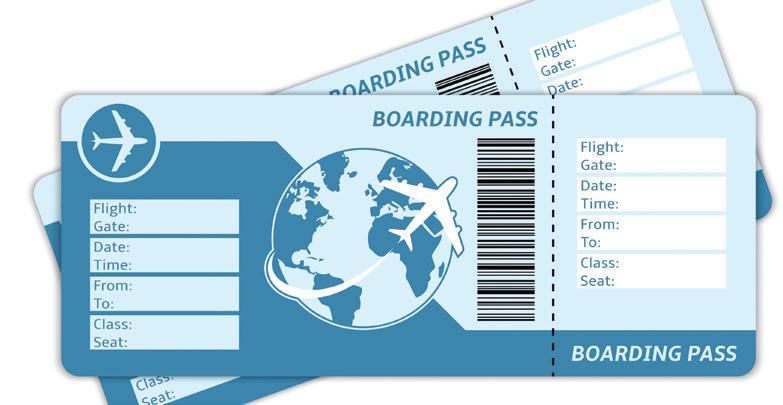


April 2025 • Vol 81, No. 2
PUBLISHER
VADM William A. Brown, USN (Ret.)
MANAGING EDITOR
Barbara Parus | bparus@ndtahq.com
CIRCULATION MANAGER
Leah Ashe | leah@ndtahq.com
PUBLISHING OFFICE
NDTA
50 South Pickett Street, Suite 220 Alexandria, VA 22304-7296 703-751-5011 • F 703-823-8761
GRAPHIC DESIGN & PRODUCTION MANAGER
Susan Hill
ADVERTISING SALES DIRECTOR Bob Schotta bschotta@cjp.com
ADVERTISING & PRODUCTION
Carden Jennings Publishing Co., Ltd. Custom Publishing Division 375 Greenbrier Drive, Suite 100 Charlottesville, VA 22901 434-817-2000 x330 • F 434-817-2020



Defense Transportation Journal (ISSN 0011-7625) is published bimonthly by the National Defense Transportation Association (NDTA), a non-profit research and educational organization; 50 South Pickett Street, Suite 220, Alexandria, VA 22304-7296, 703-751-5011. Copyright by NDTA. Periodicals postage paid at Alexandria, Virginia, and at additional mailing offices.
SUBSCRIPTION RATES: One year (six issues) $40. Two years, $60. Three years, $75. To foreign post
$45. Single copies, $6 plus postage. The DTJ is free to members. For details on membership, visit www.ndtahq.com.
POSTMASTER: Send address changes to: Defense
Barbara Parus, Managing Editor, DTJ and
We encourage contributions to the DTJ and our website. To submit an article or story idea, please see our guidelines at www.ndtahq.com/media-and-publications/submitting-articles/.

Dear NDTA Team,
VADM William A. Brown, USN (Ret.) NDTA President & CEO
We just finished an extraordinarily successful GovTravels Symposium with our co-sponsor, Defense Travel Management Office (DTMO). This year (2025) marked the largest GovTravels crowd we have ever drawn with over 1,200 attendees—signifying the importance of the trajectory and management of government travel.
A year ago, we chose the theme focusing on Change Management in passenger travel. Little did we know how important this topic would become. GovTravels is the one annual event that people working in government passenger travel need to attend.
dustry in government travel. The GPTAC committees, headed up by experts from industry and government liaisons, allow for discussion on passenger travel topics relevant to the readiness and resilience of government and industry support to government travelers.
On March 5, 2025, General Randall Reed, USAF, Commander, US Transportation Command, testified before the Senate Armed Serves Committee. He discussed the issues facing the nation and the military regarding contested logistics and the requirements needed to address such challenges. I encourage you to watch his

GovTravels is the premiere event where decision makers, leaders and managers go to get the latest trends in technology, policy, and programs. GovTravels continues to be an event focused on education, training, collaboration, and learning!
Peeling back the layers, one of the highlights of GovTravels was a clear explanation regarding the purpose and focus of NDTA’s Government Passenger Travel Advisory Council (GPTAC). The GPTAC was established to provide the committees with the structure necessary to support the collective interests of government and in-
testimony at https://www.dvidshub.net/ video/954422/transcom-commander-testifies-budget-request.
Among the topics covered was a request to buy an additional 10 used vessels for the Ready Reserve Fleet, the continued rollout of the Global Household Goods Contract, the authorities of USTRANSCOM to coordinate logistics in the contested environment, and the importance of industry for the fulfillment of USTRANSCOM’s mission. Not surprisingly, during his testimony, General Reed stressed the importance of USTRANSCOM’s Fourth
WELCOME NEW CORPORATE MEMBERS
As of April 4, 2025
CHAIRMAN’S CIRCLE
• Air Space Intelligence (ASI)
• Gartner, Inc.
PRESIDENT'S CIRCLE
• Anew Solutions
SUSTAINING
• DeSpir Logistics Network
• Evans Transportation
• FlexCold
• Green Motion International
• Kinedyne Defend
• Patriot Global Lodging
• Sea Expresss America Corporation
Component, recognizing the vital role industry plays in supporting global mobility operations.
Speaking of change, the national discussions regarding the rejuvenation of America’s industrial base and tariffs are front and center, especially for sealift and airlift. Proposals and negotiations will eventually settle into policy, and law is open for debate. Other Executive actions are currently affecting government travel and contracting—and again—the final outcomes are still TBD as we speak. One thing is certain: We will need to ensure our ability to fight and win our nation’s wars remains the objective. To do so, we will need a healthy industrial base built with collaboration between government and industry. NDTA members are fully engaged in the efforts to build and maintain the capacity needed by our Nation.
Regarding our support for future generations of logisticians, I also want to thank the many industry members who participated in supporting the NDTA Scholarship Foundation in 2024. We will recognize our donors at this year’s Fall Meeting in St. Louis in October 2025. Our NDTA Foundation Scholarship donors are responsible for helping to fund and mentor twenty 2024 deserving university students. The NDTA Foundation Scholarship program is truly helping to develop our nation’s future leaders and logisticians by providing access to education, resources and opportunities.
Please continue to stay engaged—your leadership is greatly appreciated! DTJ

A recognized industry
provides safe, secure, reliable transportation services delivered by our unique network of independent agents and capacity providers.
• One of the industry’s largest van and platform selections with over 85,600 truck capacity providers in network
• Expedited cargo vans, straight trucks and tractor-trailers
• More than 18,000 pieces of trailing equipment
• 9,000 owner-operators leased to Landstar with over 1,250 stepdecks and 970+ flatbed trailers
• Drop and hook services
• Specialty trailers ranging from beam, blade and Schnabels to double drop, stretch and multi-axles
• Secure, dedicated government services with more than 350 AA&E secret cleared teams
• Hazmat certified owner-operators
• Unit moves with on-site carrier representative





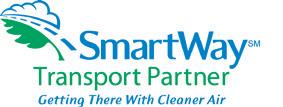
By Susan Yee, Genesis Consulting
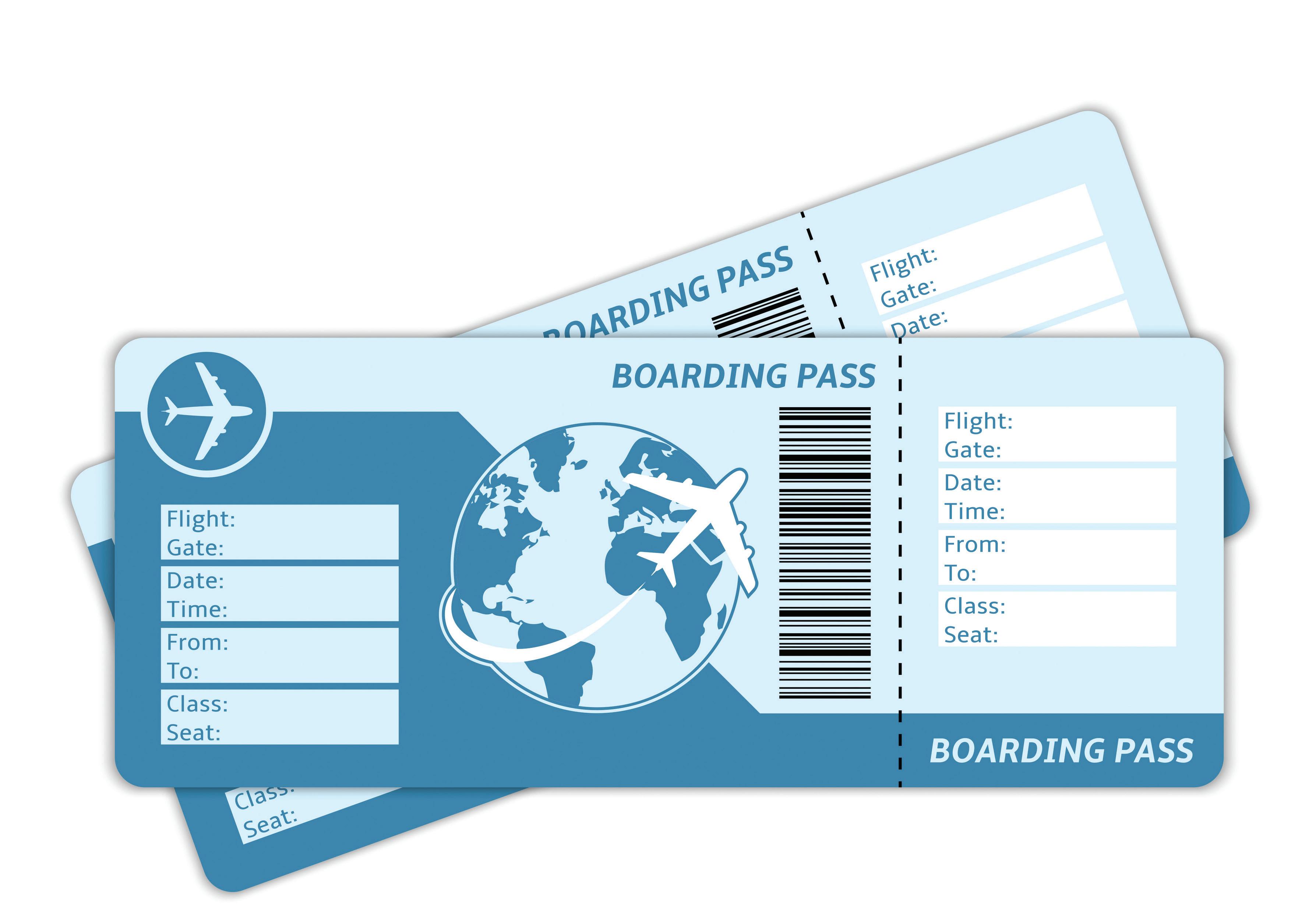
The New Distribution Capability (NDC) was developed in 2012 by the International Air Transport Association (IATA) to modernize airline distribution. It was officially launched in 2015 to enhance how airlines sell fares and ancillary services, such as seat selection and baggage fees. This enhanced distribution was also designed as a way for airlines to bypass traditional Global Distribution Systems (GDS) used by travel management companies (TMCs) and other resellers, reducing reliance on intermediary parties. By leveraging NDC, airlines can distribute fares and offer bundled ancillary products directly to customers, while exerting greater control over pricing.
Under the current City Pair Program (CPP), federal travelers use General Services Administration (GSA) negotiated fixed-rate airline fares that are obtained using contracted TMCs and their GDS platforms. The adoption of New Distribution Capability (NDC) has progressed slowly, primarily due to technical hurdles,
By leveraging NDC, airlines can distribute fares and offer bundled ancillary products directly to customers, while exerting greater control over pricing.
operational challenges, and the significant financial investment required for TMCs to upgrade their systems and back-office processes.
In 2023, NDC became a much-discussed topic in the commercial travel industry when American Airlines announced lower, NDC-exclusive fares, making them unavailable through traditional Global Distribution Systems (GDS). This decision put pressure on TMCs, forcing them to either invest in NDC integration or risk losing access to more competitive fares.
At the time, many TMCs lacked the complete technology and infrastructure to seamlessly integrate NDC content into
their existing workflows, creating disruptions in fare access and booking efficiency. Although NDC was introduced in 2015, much of the industry was not fully prepared to handle the widespread shift in airline distribution.
With these changes reshaping the travel landscape, how does NDC impact government travel programs and what are the steps to adapt?
The GSA City Pair Program (CPP) is structured to provide negotiated, fixed fares that remain consistent (for the most part, as there are exceptions) throughout the contract period. This predictability benefits government agencies in budgeting and planning official travel. Compared to publicly available fares with similar flexibility, CPP delivers significant cost savings while also guaranteeing last-seat availability at the contracted fare, ensuring reliable travel options for government travelers.
NDC fares are dynamic and can fluctuate based on availability, demand, and traveler-specific factors. While this pricing model may offer lower fares compared to CPP rates, it can just as easily present higher fares due to its pricing structure or ancillary service offerings.
According to GSA, “The distribution change involves a shift to direct sales between the airlines and corporate travelers, bypassing the GDS, travel management companies and corporate managed travel programs. This will result in further CPP program erosion, and likely require the CPP to move away from negotiations based solely on fares to negotiations based on bundles of rates, schedules and amenities inclusive of loyalty points, and impact the CPP’s ability to benchmark vs. corporate offerings.”
NDC fares are dynamic and can fluctuate based on availability, demand, and traveler-specific factors. While this pricing model may offer lower fares compared to CPP rates, it can just as easily present higher fares due to its pricing structure or ancillary service offerings.
Federal travelers may benefit from packaged offerings, such as paid seats and better selection included in the airfare. However, while these enhancements can improve the traveler experience, they may introduce challenges for agencies managing travel compliance and reporting. Additionally, current government travel technology and approved TMCs may not fully support NDC fares, making it unlikely for travelers to access those fares within the systems.
NDC introduces a broader selection of fares and benefits that were not previously accessible through traditional GDS channels. As the government program gradually adopts
this new distribution model, here are some potential areas of impact to consider.
In the future, airlines may introduce enhancements to government fares through NDC, potentially offering cost-effective alternatives to current contracted rates. However, access to these fares will depend on the technological capabilities of the TMCs supporting government agencies. To take advantage of these options, agencies must ensure their contracted TMCs have the necessary systems in place to access and process NDC fares for government travelers
Agencies will need to ensure that travelers can easily navigate and book these fares while staying within the parameters of their contracted agreements and not use unauthorized channels.
One of the significant advantages of NDC is the ability for airlines to offer customized pricing, ancillary services (like baggage or seat selection), and dynamic fare options. However, this level of customization can complicate the process of comparing fares to those in existing government contracts. With bundled services and fluctuating pricing, it can become more difficult to compare NDC fares directly with fixed, pre-negotiated government-contracted rates. Travel managers may need to adjust their strategies for fare comparison to account for these complexities, ensuring that fare transparency is maintained without compromising cost efficiency.
If NDC rates used by government travelers are not managed by contracts or guidelines, NDC could impact travel compliance. Bundled fares and services, as well as fares booked outside of approved government systems, may not align with internal agency policies, the Federal Travel Regulation (FTR), or the Joint Travel Regulations (JTR). This misalignment could result in non-payment of expenses deemed noncompliant.
NDC’s ability to bundle costs, such as including baggage fees with the airfare, adds another layer of complexity to tracking and managing these transactions.
Training your travel managers, booking agents, and employees to recognize NDC fares versus CPP fares is critical.
Incorporating New Distribution Capability (NDC) in the government travel environment presents both opportunities and challenges. As government agencies transition to working within this evolving environment, it’s important to manage the changes effectively. From a change management perspective, here are some key strategies that can help ensure a smooth transition while maintaining compliance and efficiency.
One of the first steps in managing the shift to NDC is ensuring that employees are well-informed. NDC fares differ from traditional CPP fares in both structure and accessibility, which can lead to confusion. Training your travel managers, booking agents, and employees to recognize NDC fares versus CPP fares is critical. Make sure they understand how to identify which fares are compliant and when it’s appropriate to book them. Additionally, provide guidance on how to ensure all bookings are within compliance guidelines, helping to avoid potential issues with non-compliant fare selections.
As NDC continues to evolve, there will inevitably be situations where NDC fares don’t align perfectly with existing government travel policies. In these cases, it’s important to have clear guidelines in place. Provide your team with protocols for when NDC fares might require an exception or justification for booking outside the approved methods. Whether it’s due to cost savings or a specific ancillary service, ensure your employees know how to handle these exceptions while maintaining transparency and compliance with government policies.
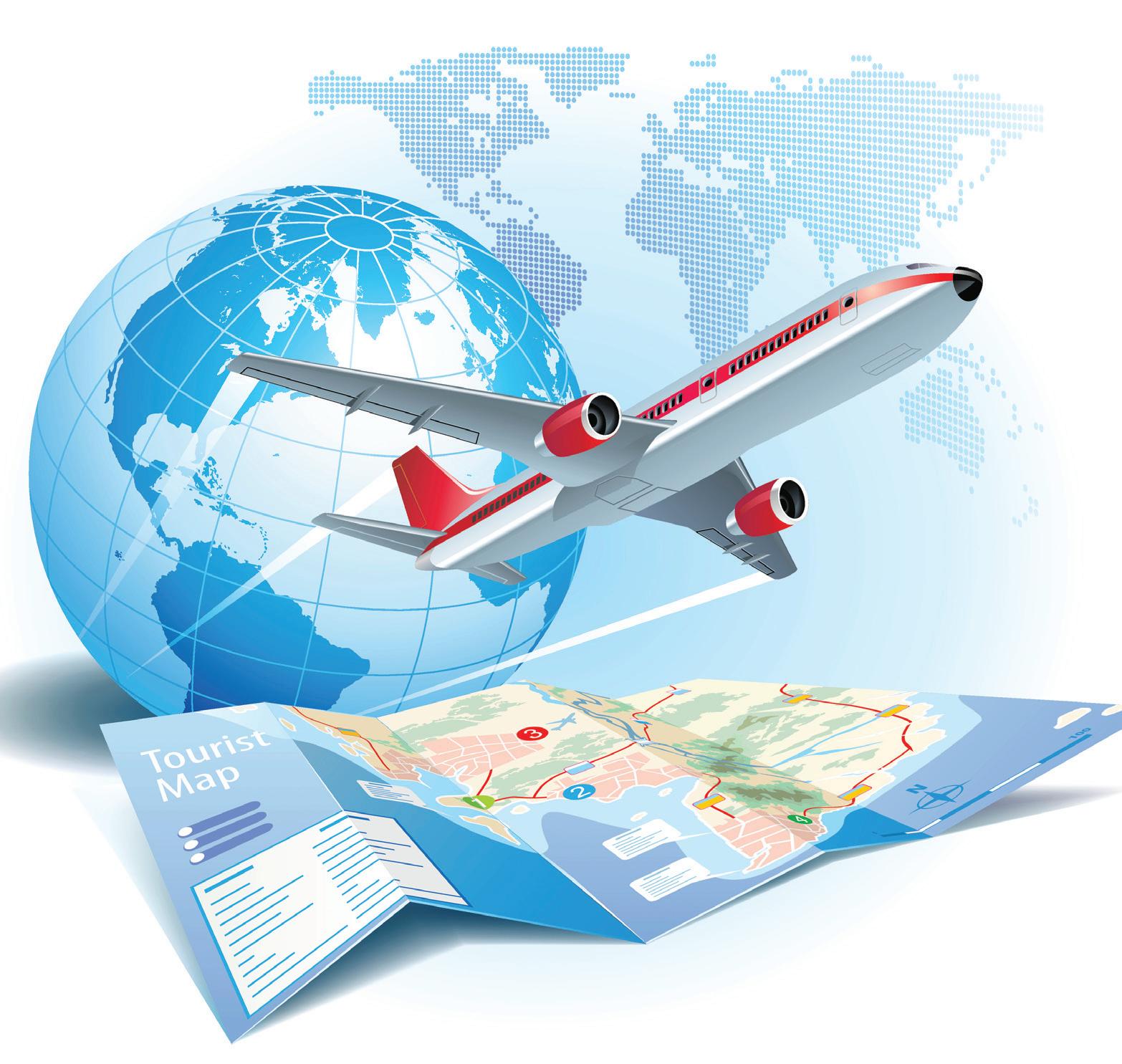
Staying informed about the ongoing changes in airline distribution and the adoption of NDC is crucial. Airlines are continuously adjusting their distribution strategies, which will impact how TMCs access fares. Staying current on industry trends ensures that your agency can anticipate and adapt to these changes. It’s important to share updates with your travelers and key stakeholders, so everyone remains aligned on the evolving landscape.
Engaging with industry stakeholders, such as the General Services Administration (GSA), the Defense Travel Management Office (DTMO) and Travel Management Companies (TMCs), is vital for advocacy and ensuring that all authorized fares remain available within approved booking systems. Work closely with these groups to influence policy and advocate for the continued availability of all government fares in the face of NDC changes. By staying engaged, your agency can help ensure that future distribution models accommodate both government needs and compliance requirements.
As of 2023, GSA is helping agencies transition from the current E-Gov Travel Service 2 (ETS2) to ETSNext, with the goal to modernize federal travel and expense management and introduce technologies that align more closely with commercial features. This implementation is scheduled for completion in June 2027 as the current ETS2 contract ends. As part of this effort, there is potential for ETSNext to incorporate NDC fares.
The rise of New Distribution Capability (NDC) presents both opportunities and challenges for government travel programs. While its dynamic pricing and enhanced services could introduce new cost-saving options, the shift away from traditional distribution models also brings risks—particularly regarding compliance, fare accessibility, and technology limitations.
As airlines continue adopting NDC, its presence in the travel industry will only grow. Recognizing the need to modernize government travel systems, GSA’s ETSNext initiative is taking steps to enhance federal travel booking capabilities and prepare agencies for future industry
Engaging with industry stakeholders, such as the General Services Administration (GSA), the Defense Travel Management Office (DTMO) and Travel Management Companies (TMCs), is vital for advocacy and ensuring that all authorized fares remain available within approved booking systems. Work closely with these groups to influence policy and advocate for the continued availability of all government fares in the face of NDC changes. By staying engaged, your agency can help ensure that future distribution models accommodate both government needs and compliance requirements.
changes. To ensure a smooth transition, agencies must proactively monitor airline distribution developments, collaborate with GSA and TMCs, and advocate for proper NDC integration within approved travel systems. By taking a strategic and informed approach, government travel programs can adapt to this evolving landscape while maintaining cost efficiency, compliance, and operational effectiveness. DTJ

Susan Yee is an analyst for Genesis Consulting specializing in corporate and government travel programs. She is currently supporting the ETSNext project. Genesis Consulting was established in 2017 and brings over 15 years of experience supporting Federal Agencies in optimizing and managing travel programs. With a strong focus on government travel modernization, Genesis has been actively engaged with GSA for over two years, contributing to the preparation and evaluation of solutions for ETSNext. Their expertise spans travel program support, policy compliance, and technology integration. Visit genesisconsulting.com

Looking forward to welcome you at one of our top branches.
Create your personal business profile in just minutes and enjoy instant bookings at exclusive company rates. With one account, you’ll access all services, simplify payments, and save time through automatic rate application and centralized data. Seamless, cost-effective, and tailored to your business needs.
Your advantages:
↗ Branches at major destinations worldwide
↗ Online Check-in for faster vehicle pick-up
↗ Loyalty program with upgrades available
↗ New and premium fl eet

Scan the QR code to set up your SIXT business profile today.

By Chloe Baker
NDTA chapters are key to the Association’s educational mission, serving as local venues for professional programs, mentoring, community outreach and networking. This issue of DTJ highlights a few NDTA chapters with news about recent leadership changes and engagement with their local logistics and transportation community.
The NDTA Jacksonville Chapter’s newly inaugurated Board includes new Chapter President Jenn Korecki, Vice President of Global Logistics at Jay Road Logistics, LLC, taking up the charge from past (2019-2025) president Charlie Ward, Account Executive, Government Services, Landstar, along with board members Angie Reno, Sabrina Brigance, William Feaster, Michael Still, Daniel Moore and TJ Strong.
Starting the year off strong, the chapter sponsored the University of North Florida (UNF) Transportation & Logistics Society Meeting on February 20, featuring military and industry speakers who covered topics related to commercial industry involvement in government logistics, plus insights on the U.S. Navy’s role in safeguarding American commerce. It was a great opportunity for young leaders at UNF to learn more about NDTA while
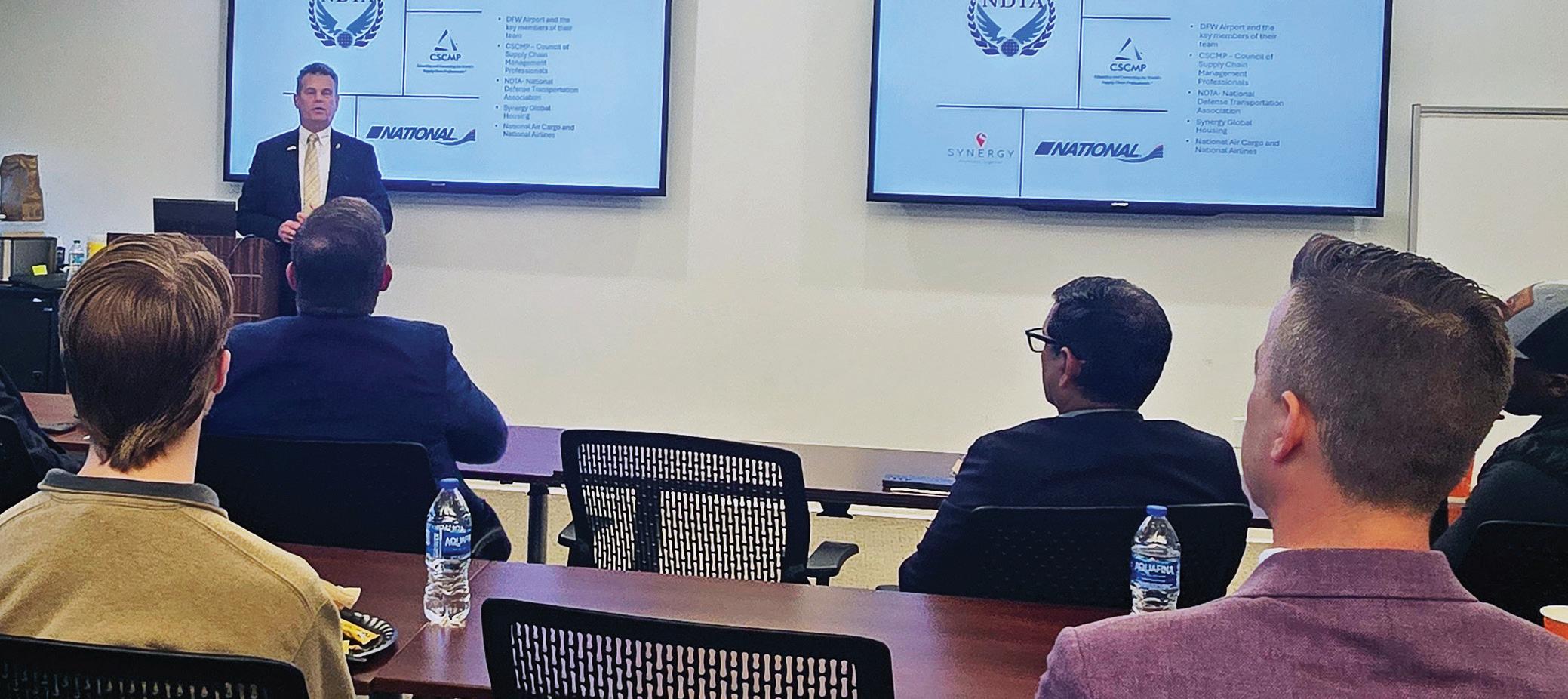
Stephen Bullard, NDTA North Texas Chapter President, welcomes attendees to the chapter’s joint meeting with CSCMP DFW Roundtable at the Dallas Fort Worth International Airport.
As of the end of March 2025, the name of the Dallas-Ft. Worth Chapter was changed to North Texas to signal a larger area of coverage. The newly revitalized chapter is under the leadership of Chapter President Stephen Bullard, Director of Business Development at National Air Cargo, Inc., with the invaluable support of board members Renee Ottley, Mark Romero, Larry Leon, Subhro Mitra and Christina Bullard.
On February 26, the chapter debuted a series of upcoming quarterly events by hosting a joint meeting with the Council of Supply Chain Management Professionals (CSCMP) DFW Roundtable at the Dallas Fort Worth International Airport (DFW) to discuss “DFW Updates: Lead-
ing the Way in Regional Growth and Global Logistics.” Attendees enjoyed lunch and networking; presentations from NDTA, CSCMP and DFW; and the chance to take an exclusive tarmac tour at DFW. Sponsored by Synergy Global Housing, National Air Cargo and National Airlines, the meeting brought government and industry professionals together to connect, share insights, and explore the future of logistics, transportation, and supply chain management in the Dallas-Fort Worth and greater North Texas region.
Follow the North Texas Chapter on LinkedIn to learn about upcoming events: www.linkedin.com/company/northtexas-ndta-national-defense-transportation-association
learning from and networking with professionals in the local transportation and logistics community.
The Jacksonville Chapter also exhibited at the U.S. Coast Guard Transition Assistance Program Workshop in Jacksonville on February 28, connecting with dozens of transitioning active duty, spouses and retirees. Check out the Events page on the Jacksonville Chapter website to see what’s coming next: www.ndtajax.com
The NDTA Scott-St. Louis Chapter has new leadership under chapter president Sekhar Prabhakar, CEO, CEdge, taking the reins from outgoing president (20222025) April Roseman, PhD, PMP, Senior DevSecOps Program Manager, SAIC. The chapter has installed a new board of directors—Greg Schwartz, Vin Sharma, Ashley Wittenstrom, Alex White and Charles Bowe—and is looking for additional chapter officers to fill the roles of Webmaster and Young Leader Chair. Stay tuned for more program and event updates coming soon from the Scott-St. Louis Chapter at www.ndtascottstlouis.org
Check out our Chapter listings at www.ndtahq.com/ membership/chapters
Or email NDTA HQ at ndtahq@ndtahq.com to get connected.
Be sure to subscribe to The Source email newsletter to stay up to date with all things NDTA!






By Barbara Parus

ilitary housing in the United States is designed to meet the diverse needs of active-duty service members, veterans, and their families. Whether for short-term relocations, temporary-duty assignments, or long-term housing during an assignment, the military provides various housing options to ensure that service members are accommodated comfortably and efficiently. With so many alternatives, how do you decide what’s best for your own unique situation?
Representatives from some of the most recognized lodging chains were on hand in the exhibit hall at the 2025 GovTravels Symposium to explain short-term and long-term military housing options with attendees.
For more information about short- and long-term housing, service members also can access their available lodging options though programs managed by the General Services Administration (GSA) and the Defense Travel Management Office (DTMO), including the Integrated Lodging Program (ILP) and FedRooms.
Short-term military housing is intended for service members and their families who are temporarily between assignments
or waiting for permanent housing at their new duty stations. These types of accommodations are critical during the periods of transition, offering flexibility and the comfort necessary for service members to adjust to their new environment.
Temporary Lodging Facilities (TLFs) are the most common form of short-term housing used by military families. These facilities are often located on or near military installations and are primarily used when a service member is transitioning between bases, during deployment preparation, or when waiting for a permanent home. TLFs are typically furnished and include essential amenities, like a kitchen, bathroom, and sleeping areas, making them a convenient option for families during a short-term stay.
Key Features of TLFs:
• Location: TLFs are located on or near military bases.
• Amenities: TLFs Include basic kitchenettes or kitchens, bathrooms, and living areas.
• Duration: A stay at a TLF is typically from a few days to several weeks, al-

though it can be extended if necessary.
• Cost: TLFs are subsidized by the government, but service members may need to pay out-of-pocket, with potential reimbursement options.
Some of the largest and most common TLF providers include:
Air Force Inns https://af.dodlodging.net
Managed by the US Air Force, these temporary lodging facilities offer affordable accommodations for service members and their families across Air Force bases.
Navy Gateway Inns and Suites: These facilities provide lodging for military personnel and their families in convenient locations near US Navy installations.
Army Lodging https://ngis.dodlodging.net
Operated by the US Army, these facilities cater to soldiers, their families, and other personnel requiring short-term housing.
In cases where no TLFs are available or the facilities are fully booked, service members may be assigned to government-contracted hotels. Several hotel chains have agree-


ments with the Department of Defense (DoD) to provide affordable and accessible lodging to military personnel during their short-term stays during relocations, temporary-duty assignments (TDY), or other military travel.
Key Features of Government-Contracted Hotels:
• Location: The hotels are typically near military installations or in major cities.
• Amenities: Standard hotel features include Wi-Fi, breakfast, and room service.
• Cost: Rates are often lower than those of commercial hotels and are frequently covered by a military per diem.
Below is a list of some of the well-known hotel brands:
Comfort Inn and Quality Inn choicehotels.com
Comfort Inn and Quality Inn, both part of Choice Hotels, provide affordable government lodging and are common options for military members traveling on shortterm assignments or during relocations across the United States.
Hilton Hotels hiltonhotels.com
Hilton is another major hotel chain that participates in government lodging contracts. Hilton offers a wide range of properties that cater to military personnel, including:
• Hilton Garden Inn
• Hampton Inn
• Homewood Suites by Hilton
• Embassy Suites by Hilton
Holiday Inn (InterContinental Hotels Group) ihg.com
Holiday Inn, part of InterContinental Hotels Group (IHG), provides a wide selection of hotels for military personnel. These hotels offer government rates and are often used for temporary lodging during duty travel. Some of the IHG brands include:
• Holiday Inn Express
• Holiday Inn
• Staybridge Suites
Marriott Hotels marriott.com
Marriott is a leading global hotel chain that partners with the US military to provide discounted government rates for service members. Marriott's governmentcontracted hotels include a variety of brands under its umbrella, such as:
• Courtyard by Marriott
• Residence Inn by Marriott
• Fairfield Inn & Suites by Marriott
• SpringHill Suites by Marriott
• TownePlace Suites, another brand under the Marriott umbrella, offers extendedstay accommodations suitable for military personnel who need temporary lodging for several weeks or months.
Best Western Hotels bestwestern.com
Best Western, a well-known hotel chain, also participates in the government lodging program. Military personnel can find discounted rates at many of their locations across the country, including:
• Best Western
• Best Western Plus
• Best Western Premier
La Quinta and Wingate by Wyndham wyndhamhotels.com
La Quinta and Wingate, both part of Wyndham Hotels & Resorts, provide discounted lodging for service members through government contracts. La Quinta is known for its comfortable accommodations, convenient amenities, and pet-friendly policies. They have locations throughout the United States.
Super 8 by Wyndham
wyndhamhotels.com/super-8
Super 8 is another budget-friendly hotel chain that participates in the government lodging program. It offers affordable rates and basic amenities for military personnel.
A relative newcomer to the lodging industry, My Place opened its first franchise in 2014. It provides a single point of contact

sales approach to ensure your booking needs are exceeded by creating a customized booking process. Whether it’s one night at a single hotel or a hundred nights at dozens of hotels, the My Place team will find the right solution for your needs. All My Place guest rooms feature a fully applianced kitchen, a business workstation, and plush mattresses for a restful night. The pet-friendly properties include on-site laundry, high-speed internet, and a 24hour My Store.
These hotel brands are often featured in the DoD’s Government Travel System (GTS) and Defense Travel System (DTS), where military personnel can book lodging at government-approved rates. The rates are typically lower than commercial rates and are designed to accommodate the needs of active-duty military members, including those on temporary duty (TDY), Permanent Change of Station (PCS), or leave.
Military service members and their families can typically book these governmentcontracted hotel accommodations through official military travel portals or by contacting the hotels directly. Additionally, the Department of Defense (DoD) may offer a per diem to help offset the cost of lodging during military travel.
Extended Stay America extemdedstayamerica.com
Extended Stay America specializes in longterm stays and offers government rates for military members in need of temporary housing for an extended period, such as for training or relocation purposes. The military often advocates for Extended Stay hotels as accommodations for service members in certain situations due to their flexibility, cost-effectiveness, and the ame-

nities they provide. Here are a few reasons why Extended Stay hotels might be preferred or recommended:
Length of stay: Extended Stay hotels are designed for longer stays, typically more than a few nights. They offer a home-like environment with amenities like kitchenettes or full kitchens, which can be especially useful for service members who need to stay for extended periods due to temporary assignments, training, or relocation.
Cost-effectiveness: Extended Stay hotels often provide better rates for longer stays compared to traditional hotels. This can help save on accommodation costs for the military, which may be important when managing budgets for service members on temporary duty.
Flexibility and comfort: These hotels offer more space and comfort than standard hotel rooms, providing a more convenient living space for service members. Many Extended Stay hotels also provide laundry facilities, fitness centers, and other amenities, making them ideal for individuals on long-term assignments who may need these services.
Proximity to military installations: Many Extended Stay hotels are located near military bases, training facilities, or deployment hubs, making them a convenient option for service members who are temporarily stationed at these locations.
Government per diem: In some cases, Extended Stay hotels can be an eligible accommodation under the government per diem system, which is used to reimburse service members for lodging and other travel expenses while on temporary duty. The cost of staying in these hotels might be within the limits of what the military reimburses for lodging.
Bottom line: The military supports Extended Stay hotels for their practicality, costeffectiveness, and ability to provide a comfortable, long-term living space for service members on temporary assignments.
IHG Army Hotels ihg.com
IHG Army Hotels is a special brand of hotels designed specifically for US Army service members, their families, retirees, and DoD employees. It is part of the InterContinental Hotels Group (IHG), a global hotel company. IHG Army Hotels are operated under a partnership between
the Army and IHG, with the goal of providing quality, affordable accommodations on or near large US Army bases worldwide.
This option offers convenience for service members who need quick access to military facilities or who are transitioning between duty stations, especially during a PCS move or while awaiting more permanent housing. Some of the more common ones are Fort Bragg, Fort Hood, Fort Belvoir, and Fort Lewis.
IHG accommodations are usually hotel-style rooms, but some properties offer suites or extended-stay options with amenities like kitchenettes for families or personnel who need longer stays. Rooms are furnished with comfortable, modern ame-

nities, and properties may offer options ranging from standard rooms to suites that are ideal for families or groups.
Many locations offer services and amenities to enable guests to maintain their daily routines without missing a beat, including complimentary Wi-Fi; business services (computers, printers, and meeting rooms); an on-site restaurant, breakfast options, nearby restaurants, and kitchenettes for longer stays. Some IHG Army Hotels even allow pets!
IHG Army Hotels are more affordable than traditional civilian hotels, and they cater specifically to military personnel, offering a cost-effective way for service members and their families to find temporary lodging during transitions. Rates are often aligned with government per diem rates, which is especially beneficial for service members on official travel or relocations.
Reservations: IHG Army Hotels can be booked via the IHG Army Hotels website or through the general IHG website. Service members can often book these hotels at discounted rates. As part of the InterContinental Rewards program, guests can accumulate points for their stays, which can be redeemed for free nights or
upgrades in the future. Military members also can take advantage of special offers and promotions.
Churchill Living churchillliving.com
Specializing in furnished temporary housing and corporate housing solutions, Churchill Living offers flexible and fully furnished apartments for individuals and families who need housing for short or extended periods. Churchill Living is known for its FedRooms program for miliary and government contractors who need temporary housing. Here’s a breakdown of what the two programs offer:
Churchill Living is ideal for military personnel, government employees, or contractors who need a home-like environment during assignments, training, relocations, or temporary job postings. The apartments include furniture, appliances, utilities, housewares, and housekeeping services depending on the location and agreement.
Locations: Churchill Living offers furnished apartments in various cities and locations, making it suitable for service members and government employees who are on temporary duty or relocating. The inventory includes apartments, homes, and condominiums, located in key urban and suburban areas throughout the United States.
Flexible lease terms: Churchill Living’s accommodations are flexible, providing short-term leases (typically 30 days or more) to accommodate those on temporary assignments or in transition. This is ideal for military families who are between PCS moves or other types of military-related relocations.
FedRooms is a government-approved lodging program that provides discounted, temporary housing options for federal employees, including military service members, during business travel, assignments, or relocations. FedRooms properties are pre-screened to ensure they meet government standards for safety, cleanliness, and comfort.
The FedRooms program is specifically for federal employees, including military personnel, federal contractors, and other DoD employees. Service members and their families can use FedRooms to find accommodations when relocating
for a PCS move, training, or TDY assignments.
Affordability: The FedRooms program provides special government rates, which are usually lower than commercial rates at participating hotels or furnished apartments. The rates are negotiated to comply with the GSA per diem guidelines, making it more affordable for federal workers.
Convenience and comfort: All FedRooms properties are vetted for quality, safety, and designed to provide a comfortable environment that feels like home with amenities suitable for extended stays, whether a few weeks or several months. They are fully furnished with everything needed to live comfortably, including furniture, appliances, housewares, and utilities (including electricity, water, internet, cable). Some properties even allow pets!
Since many Churchill Living FedRooms properties are located near military bases, federal agencies, and key urban centers, they provide easy access to workplaces and amenities. Churchill Living also provides support from finding the right property to booking accommodations and handling paperwork.
How to book: Service members or federal employees can visit the FedRooms website, a dedicated platform for booking government-approved lodging, or use the Churchill Living website to search for available properties.
The best housing option depends on personal preferences, family needs, and the specific circumstances of each assignment.
The best housing option depends on personal preferences, family needs, and the specific circumstances of each assignment. The gamut of military housing alternatives offers both stability and flexibility, with various benefits tailored to support the well-being of service members and their families. The decision that aligns with your own personal and family situation is most likely the best choice for you.
Last, but not least, the exhibitor list of 2025 GovTravels Symposium features some upscale options for those jetting off for corporate meetings, sightseeing excursions or family reunions.
Club Quarters (clubquartershotels.com) are centrally located hotels suited for business and pleasure in the heart of the city you’ll call home. From New York’s bustling Midtown to San Francisco's energetic waterfront, Club Quarters Hotels are strategically located where business and culture intersect.
Drury Hotels Company, LLC (druryhotels.com): Your reasons for traveling can change—so can your expectations. Drury offers three distinct options for meeting your unique needs for every journey. Whether you choose Drury Inn, Drury Plaza or Pear Tree Inn, you’ll always receive a warm welcome, cozy accommodations, and award-winning service.
Executive Inn & Suites is designed for executives, families, groups and couples, with your choice of guest rooms or suites. Seamlessly incorporated guest comforts include free Wi-Fi and flat-screen TVs with Direct TV, HBO® and other movie channels. We also offer microwaves, refrigerators, laptopsize safes and daily housekeeping.
Hyatt Hotels (hyatt.com) is a multinational hospitality company that manages and franchises luxury and business hotels, resorts, and vacation properties. The sparkling guest rooms and suites include free Wi-Fi, an onsite restaurant, fitness center, digital key and check-in, and a concierge in an upscale atmosphere.
National Corporate Housing (nationalcorporatehousing.com) offers one of the largest geographic coverage areas in the United States and the world for temporary, furnished corporate housing. A personal travel agent will locate, book, change, and/or cancel all travel reservations, and quickly solve issues that may arise, including ticket and reservation changes, due to travel delays.
Preferred Corporate Housing (preferred.com) excels at creating exceptional short-term housing solutions for individuals and organizations, specializ -
ing in business housing in prime locations nationwide that meets the diverse needs of professionals on the move. A curated selection of fully furnished apartments is designed for comfort and convenience.
Sonesta International Hotels (sonesta. com): With 13 industry-leading brands to choose from, you have access to over 1,100 hotels offering a wide range of hospitality experiences across the US and beyond. Work meetings. Custom events. Weddings, reunions, and friends’ getaways.
Turn-Key Corporate Housing (turnkeycorporatehousing.com) provides temporary housing that feels like home, whether you’re a traveling medical professional or need housing during home renovation or repairs. The properties are furnished down to the linens, dishes and housewares and include washers and dryers. Most properties have fenced yards for dogs!
United Corporate Housing (unitedcorporatehousing.com): Driven by an unwavering commitment to the motto, “Live Where You Stay,” United Corporate Housing aims to craft a genuine home away from home experience for all our esteemed guests. It serves clients across the US and international destinations, including Germany, Italy and Spain.
Washington Plaza Hotel (washingtonplazahotel.com) is located in one of DC’s trendiest neighborhoods, steps from the 14th Street Corridor, Logan Circle, and only minutes from Washington, DC’s iconic museums, monuments and attractions. Choose a room with a balcony overlooking the sparkling pool or a residentinspired suite. Each hotel room is uniquely furnished and provides optimal comfort.
With so many options to suit your unique situation, you can take your pick!
DTJ

Barbara Parus is the managing editor of DTJ and The Source newsletter. To pitch an idea for a feature article, please contact her at bparus@ndtahq.com.

More than 1,200 experts from across the federal government and the commercial travel industry gathered to learn, network, and exchange ideas at the GovTravels 2025 Symposium at the Hilton Alexandria Mark Center Hotel in Alexandria, Va., Feb. 24-27 This marks a 12% increase over the 2024 Symposium.
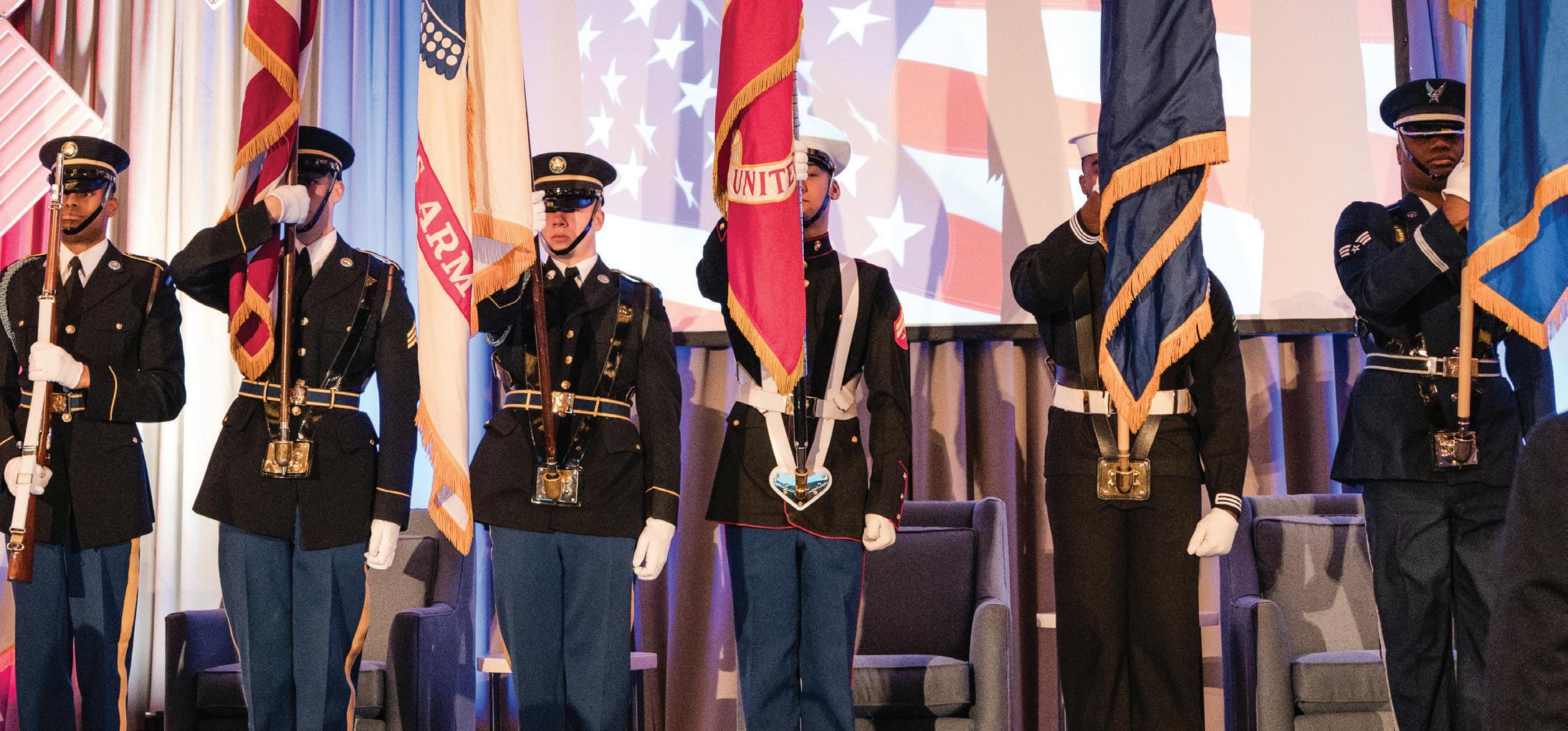
GovTravels is co-sponsored by the National Defense Transportation Association (NDTA) and the Defense Travel Management Office (DTMO), in association with the General Services Administration (GSA), and the NDTA Government Passenger Travel Advisory Council (GPTAC) and its committees. Each year, GovTravels brings together travel and transportation professionals to build relationships, exchange ideas, educate and collaborate, learn about innovative technologies, and find ways to improve the federal government’s commercial travel needs. This year’s theme, “Change Management: Challenges & Solutions in Government Travel,” focused on the need for government and industry leaders to effectively manage change by employing creative and innovative solutions to provide government passengers with world-class travel. The theme was timely, considering the changes being implemented and adapted across all federal organizations.
NDTA President and CEO VADM William A. Brown, USN (Ret.), served as master of ceremonies. He underscored the significance of collaboration between government and industry in navigating the challenges and opportunities presented by technological advancements and sustainability imperatives in a rapidly changing world. After VADM Brown’s remarks, the Military District of Washington’s Joint Armed Forces Color Guard presented the colors, and US Air Force Band Singing Sergeants vocalist TSgt Adam von Almen performed the National Anthem, followed by an intro video created by NDTA’s own Chloe Baker to kick off an exciting week.
Bryan Scott, Chair of NDTA’s GPTAC, provided an overview of the meeting presentations. He also recognized the hard work of members of the GPTAC, including the Council’s Vice Chair and the Chairs of its six committees, which include the Airline, Bus, Lodging, Long-Term

Lodging, Rental Car, and Travel Management Company Committees.
Jennifer McPherson-Todd welcomed the audience on behalf of DTMO. She acknowledged that the travel landscape has undergone significant changes in recent years and emphasized the importance of sustainability in government travel while incorporating advances in high technology and AI.
GovTravels provided a platform for a robust exchange of ideas and best practices, empowering participants to glean actionable insights and forge meaningful connections. The event schedule featured a wide variety of interactive government and industry meetings and professional development sessions, keynote speakers, panels, fireside chats, exhibits, networking sessions, and Travel Academy classes which offered attendees the chance to earn continuing education units.
General Sessions at GovTravels served up two keynotes by industry experts to inspire, inform and set the tone of the event. Two moderated panels presented diverse perspectives from topic experts, allowing attendees to gain a broader understanding of complex issues and foster audience interaction. A fireside chat with NDTA and DTMO leadership fostered deep connections between the speakers and the audience, leading to unique candid insights about industry trends in a professionally relaxed atmosphere.
Meetings and Breakout Sessions led by industry experts provided opportunities for hands-on learning and knowledge acquisition. The schedule of fluid and collaborative Joint Government and Industry meetings centered around car rental, the hotel industry, the Federal Agencies and DoD Rideshare Program Overview, DTMO Ted Talks, and Understanding and Overcoming the Challenges of Traveling with Military/Government Working Dogs.
The Expo showcased the latest products, services and technologies from various vendors, allowing attendees to explore solutions for their specific needs and challenges. The spacious two-level exhibit floor plan facilitated peer-to-peer sharing and interaction with ample networking space for industry, government, and military representatives to connect and collaborate.
The Travel Academy, an important feature of the Symposium, enabled attendees to connect with subject matter experts in government passenger travel. The Academy offered four educational tracks with a total of 15 hour-long classes spread out over four days. In response to last year’s feedback, NDTA and DTMO expanded the number of days for Academy sessions to keep up with demand and allow for the most popular sessions to be held more than once in larger meeting rooms.

The tracks focused on topics specific to government passenger travel in the following key areas:
• Travel Policy & Compliance
• Technology & Innovation
• Challenges & Solutions
• Travel Program Management
For topics, visit: www.ndtahq.com/ events/gov-travels/agenda-3/
View Travel Academy videos: www. ndtahq.com/multimedia-archive/videos/ View select Travel Academy slides: www. ndtahq.com/govtravels-2025-academyclasses/

VADM Brown introduced Mr. Del Ross, a travel industry expert at McKinsey & Company, who addressed AI's transformative role in the travel industry, emphasizing the importance of understanding and adapting to technological change. He shared his insights into the industry’s postCOVID recovery, AI applications, and its implications for the workforce.
Mr. Ross has an extensive background in revenue generation, technology, and operational performance. He has held leadership positions in major travel-related companies, including Hotel Effectiveness and
IHG Americas, where he contributed to multi-billion-dollar revenue growth. His experience spans hotels, airlines, car rentals, cruises, and travel technology.
The travel industry has rebounded significantly, surpassing pre-pandemic levels in revenue and business travel, according to Mr. Ross. Meetings and events, once devastated, have returned, driving demand for hospitality services. Staffing has improved, though finding skilled workers remains a challenge. Shifts in work-fromhome and return-to-office trends have also influenced travel patterns. The flexibility of remote work initially reduced corporate travel, but as employees return to offices, business travel has surged.
AI plays a growing role in travel but is not without limitations. While it enhances efficiency, automates tasks, and improves customer experiences, AI still struggles with nuances and human-like decisionmaking. For example, robotic vacuum cleaners in hotels fail when encountering obstacles like socks, requiring human intervention. Similarly, AI may suggest logical but impractical solutions, missing the subtlety of human communication.
Current AI applications in travel include automated itinerary planning, compliance monitoring, invoicing, and process improvements. AI can streamline travel planning by analyzing a traveler’s calendar, selecting flights and hotels within policy guidelines, and presenting an optimized itinerary for approval. This automation can save significant time and improve efficiency. Additionally, AI improves compliance, making it easier to track expenses and ensure policy adherence.
“Imagine an AI bot that has access to your calendar, sees all your meetings with locations tagged, and automatically builds a compliant itinerary with flights, hotels, and dining options, all within per diem limits. All the traveler has to do is hit ‘approve.’ This will be a massive time saver.”
Ross paused to ask the audience, “Then, you also have the advent of AI, where servicing may be done by a bot that was done by a human yesterday. The question is: How do you take advantage of that efficiency opportunity to improve user experience?”
“Imagine an AI bot that has access to your calendar, sees all your meetings with locations tagged, and automatically builds a compliant itinerary with flights, hotels, and dining options, all within per diem limits. All the traveler has to do is hit ‘approve.’ This will be a massive time saver,” said Ross.
He continued, “AI is also poised to improve compliance, streamline invoicing, and provide negotiation support by ensuring complete information is available to all parties. The key takeaway is that AI is not about replacing workers—it’s about enhancing efficiency and freeing up time for higher-value tasks.”
“We are in a world of change, and the best strategy is to be an agent of change rather than resisting it. AI is a tool that, when used thoughtfully, can help us change intelligently and make our industries stronger. Let’s embrace it and use it to our advantage.”

Mr. Kurt Ekert, President and CEO of Sabre, a leading technology platform for the travel and hospitality industry, took the stage after a glowing introduction by Mr. Jeremiah Macon, Director of Sales for Kalyan Hospitality and NDTA Washington DC Chapter Young Leader Representative.
Ekert, who has a track record in driving growth and turnaround, served as President and CEO of CWT, where he led a digital transformation and achieved $7 billion in new business wins. He also has held governance roles, including Chairman of the US Department of Commerce Travel and Tourism Advisory Board and director positions for several organizations. He is a graduate of the Wharton School and a former US Army officer.
Ekert opened his talk by addressing the inevitability of change and how organizations must proactively manage it rather than react to it. He described Sabre as “the technical plumbing of the travel industry.” It is a key player in the industry, providing the technology infrastructure that connects airlines, hotels, agencies, and corporate buyers. Sabre has 16,000 searches per second on its system, making it a critical component in the travel ecosystem.

Regarding government travel, he praised current systems for ensuring data and travel security, cost efficiency, and compliance. However, he pointed out that consumer expectations have shifted significantly due to advancements in e-commerce and AI. Government travelers now expect a seamless, user-friendly experience similar to what they receive from consumer platforms. He emphasized the increasing complexity of travel content, with suppliers fragmenting inventory and offering more à la carte services, making true price comparison more difficult.
Ekert shared insights into Sabre’s transformation under his leadership. When he joined, he found an internal culture resistant to change, with a belief that Sabre’s market leadership was secure. He tackled this by focusing on internal sales—convincing employees of the need for change, which he described as harder than external sales. He stressed that innovation is key to survival, particularly in the tech industry, and that change must be driven by both logic and emotional engagement. In closing, he opened the floor to audience questions on a variety of topics.

Moderator: Mr. Dale Buckner, Chief Executive Officer and President, Global Guardian Panelists:
• Mr. Colin O’Brien, Chief Security Officer, United States Institute of Peace (USIP)
• Mr. Dane Molter, Vice President, Navan Group Core Travel Product & Strategy
• Mr. Steve Croft, Strategic Account Management & Partnerships, Travelport
The panel discussion, moderated by Mr. Dale Buckner, CEO of Global Guardian, explored how AI and technology are reshaping travel management, security, and incident response. Buckner set the stage by highlighting AI’s rapid evolution and its real-world applications. Mr. Molter emphasized the importance of staying updated with AI trends through open-source research, industry blogs, and dedicated AI teams. Mr. Croft reinforced that businesses must continually invest in AI to remain competitive.
Mr. O’Brien shared a compelling example in which AI facilitated the evacuation of personnel from Israel during a missile
exchange by identifying flight routes before they became publicly available. Mr. Molter explained how AI-driven systems like Navan Cognition enhance incident response by automating trip adjustments based on real-time alerts.
Croft discussed AI’s role in optimizing travel infrastructure, from supplier inventory management to personalized traveler content. Molter elaborated on AI’s costsaving benefits, including self-service options, dynamic pricing, and compliance optimization. However, O’Brien cautioned that AI has limitations, particularly in regions with scare data, making traditional security assessments indispensable.
Regarding New Distribution Capability (NDC), Croft noted AI’s role in streamlining booking and service processes. Molter highlighted how API-driven platforms enable AI applications, moving away from outdated legacy systems. O’Brien underscored AI’s predictive capabilities in risk analysis, helping organizations anticipate disruptions caused by natural disasters or civil unrest.
The discussion also covered human-AI interaction, with Molter explaining how AI-driven interfaces dynamically adapt to user needs. Looking ahead, Croft predicted gradual AI adoption despite technological advancements, while Molter stressed that human readiness would ultimately determine AI’s impact.
The panel also addressed AI failures, with Molter recounting an instance where an AI booking agent generated incorrect responses, necessitating retraining. O’Brien warned about AI’s potential misuse, such as disinformation and cyber threats. The session concluded with a consensus: AI is revolutionizing travel management, but human oversight is crucial to mitigate risks and maximize its benefits.
The discussion provided valuable insights for corporate and government travel managers, showcasing AI’s role in enhancing safety, streamlining communication, and improving decision-making in crisis scenarios.



Introduction by Young Leader Mr. Chris Woods, Policy and Regulations Branch, DTMO
Moderator: Mr. Christopher McLaughlin, Senior Director, National Sales, Aimbridge Hospitality
Panelists:
• Ms. Andrea Carlock, Senior Functional Advisor, DTMO
• Ms. Laurey Goebel, Client Services Account Manager, Omega World Travel
• Mr. Greg Harkins, President CWTSatoTravel; Global Lead, CWT Defense and Government
continued on page 22
This panel discussion focused on changes in travel management and their impact on Travel Management Companies (TMCs), emphasizing efficiency and customer service enhancements. Moderated by Chris McLaughlin, industry experts shared insights on optimizing operations.
One key improvement involves adjusting staffing based on call volumes, ensuring more agents are available during peak times while supervisors step in during surges. Automation plays a crucial role, with AI virtual agents handling policy inquiries and cancellations, alongside chat functions that allow interaction with bots or live agents. Self-service options, such as online cancellations, further streamline processes.
Customer service enhancements include proactive communication via emails, website alerts, and phone messages to keep travelers informed. Better training ensures agents handle inquiries efficiently, reducing unnecessary escalations. Data analysis of call trends and resolution times informs staffing, training, and technology investments.
Looking ahead, panelists expressed excitement about reimagining the traveler experience. Andrea Carlock emphasized embracing innovation, AI, and new staffing and training models to create a better system. Laurey Goebel highlighted growing collaboration between government and industry, moving beyond compliance to a more holistic ecosystem approach. Greg Harkins noted the promise of advanced data analytics and the fresh energy brought by a new generation of travel professionals.
A critical issue discussed was duty of care, particularly with the rise of remote work. Ensuring traveler safety requires real-time tracking, updated traveler profiles, and strong emergency response systems, supported by pre-trip briefings, travel alerts, and after-hours assistance.
While automation improves efficiency, the need for human interaction remains. AI helps manage routine tasks, allowing agents to focus on complex situations, ensuring a balance between automation and personalized service. Automation empowers agents; it does not replace them.
In summary, travel management is evolving through strategic staffing, automation, proactive communication, and collaboration, making travel more seamless while maintaining essential human touchpoints.
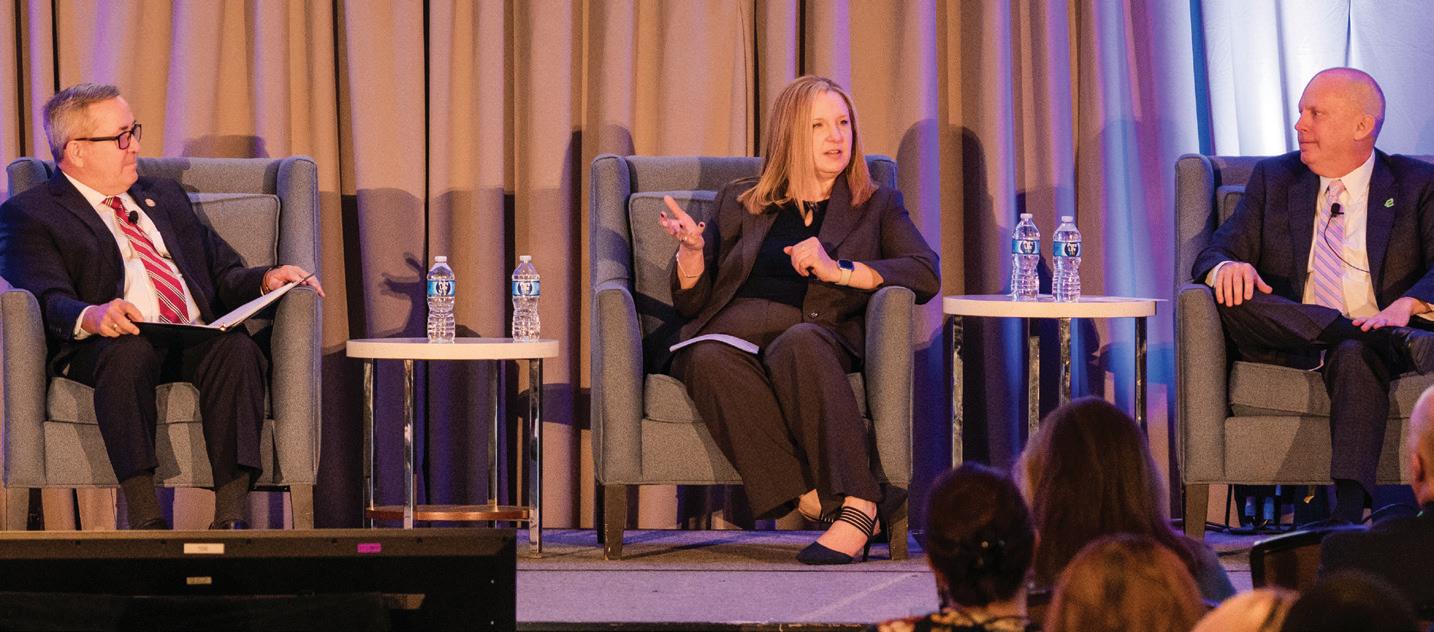
Moderator: VADM William A. Brown, USN (Ret.), President & CEO, NDTA
Chat Participants: Sarah Moore, Deputy Director, DTMO, and Bryan Scott, Chair, GPTAC
The session explored GPTAC’s role in fostering collaboration between government and industry to improve government passenger travel. The discussion traced GPTAC’s origins, highlighting how it was formed under NDTA after the dissolution of the Society of Government Travel Professionals (SGTP). GPTAC has now been operational for six years, serving as a key link between DTMO, industry, and government stakeholders.
Bryan Scott, GPTAC’s current chair, explained that NDTA already had committees for various transportation sectors, but passenger travel was too broad to fit within a single group. As a result, GPTAC was created to bring government and industry together to solve travel-related issues. Unlike advocacy groups, GPTAC is advisory-focused, prioritizing education and dialogue over lobbying.
GPTAC operates through several specialized committees, each addressing a different travel sector and chaired by an industry member:
• Airline Committee (Justin Schiffner, Southwest Airlines)
• Bus Committee (Lauren Gibson, StarForce National Inc.)
• Lodging Committee (Chris McLaughlin, Aimbridge Hospitality)
• Long-Term Lodging Committee (Jason Moore, Patriot Global Lodging LLC [SDVOSB])
• Rental Car Committee ( Michael DeRosa , The Hertz Corporation)
• Travel Management Company Committee ( Marlene Gray, Omega World Travel)
A major strength of GPTAC is its ability to foster communication and drive incremental progress on travel challenges. Examples of its impact include:
• During COVID-19, GPTAC helped revise car rental contracts after fleet shortages affected government travel.
• The council supported improving travel conditions for military working dogs, an issue championed by the Air Force.
Sarah Moore emphasized that GPTAC serves as a “critical bridge” between DTMO and industry, ensuring that field-level travel concerns are addressed efficiently.
Looking ahead, GPTAC aims to enhance the government traveler experience through digital innovations such as mobile boarding passes, digital hotel keys, and streamlined rental check-ins. Additionally, it is expanding into Europe to address regional travel challenges.
During the Q&A session, participants asked about vehicle shortages, NDTA chapter activities, GovTravels planning, and industry committee participation. Panelists encouraged greater government involvement, noting that GPTAC’s effectiveness depends on active engagement from government liaisons.
The annual Young Leaders Lunch at GovTravels provided early-career professionals a valuable networking and learning opportunity. Facilitated by Mr. Hunter McGuire, NDTA Young Leaders Chair, the luncheon featured a panel moderated by Ms. Andrea Carlock, Senior Func-
tional Advisor at DTMO. Panelists included 2025 DoD Excellence in Practice Award recipients: A1C Katherine Lockwood, Corporal Chelsea BurgosMartinez, Ms. Alexis Durm, Ms. Lauriann Brown, Mr. Daniel Vargas, and Ms. Tomorrow Singleton. The group shared
candid insights on career growth, discussing critical professional skills such as teamwork, perseverance, mentorship and leadership, with closing words of advice from VADM Andy Brown, President & CEO, NDTA.

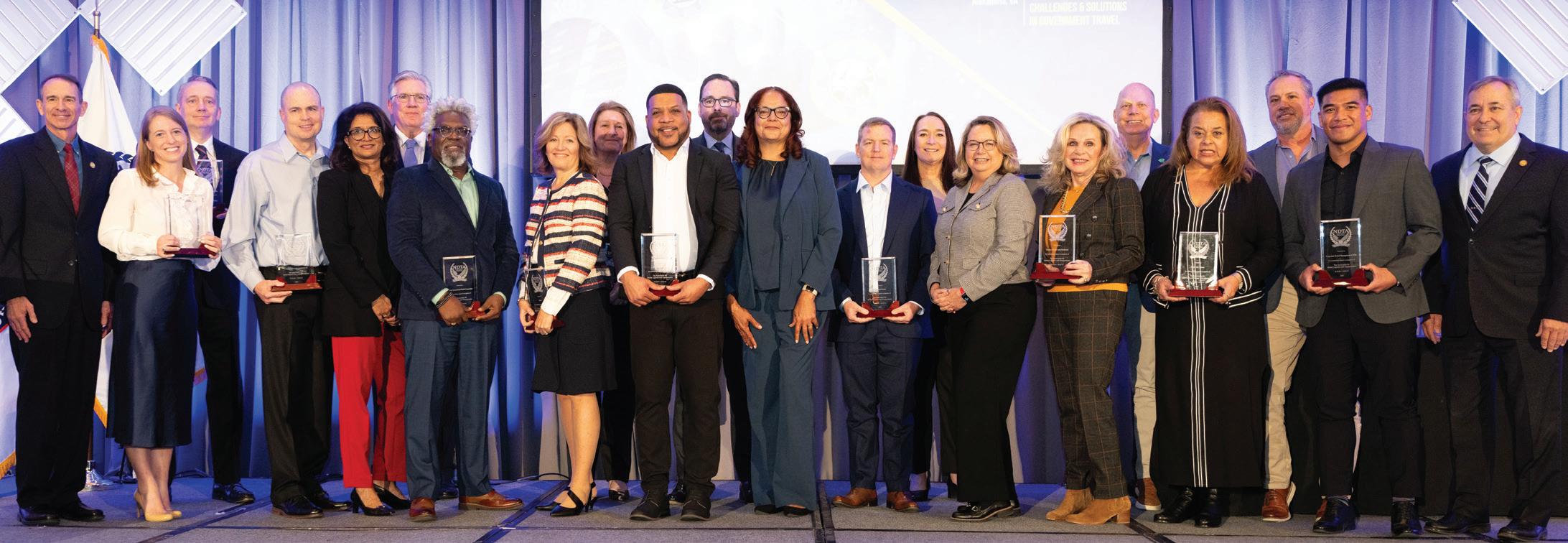
Congratulations to the travel industry recipients of the 2024 NDTA Corporate Distinguished Service Award: 3Sixty, Avis Budget Group, Choice Hotels International, Corporate Travel Management
(CTM), CWTSatoTravel, Delta Air Lines, Drury Hotels Company, LLC, Enterprise Rent-A-Car, Europcar Mobility Group, Omega World Travel, ReloQuest, Sabre, SAP Concur, SIXT Rent A Car LLC,
Sonesta International Hotels, Southwest Airlines, Travelport, United Airlines, and Wyndham Hotels & Resorts.



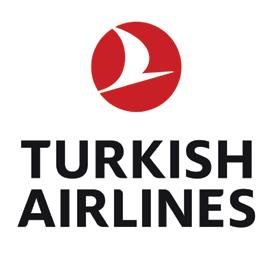





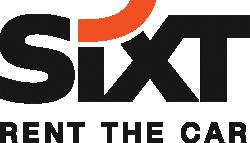




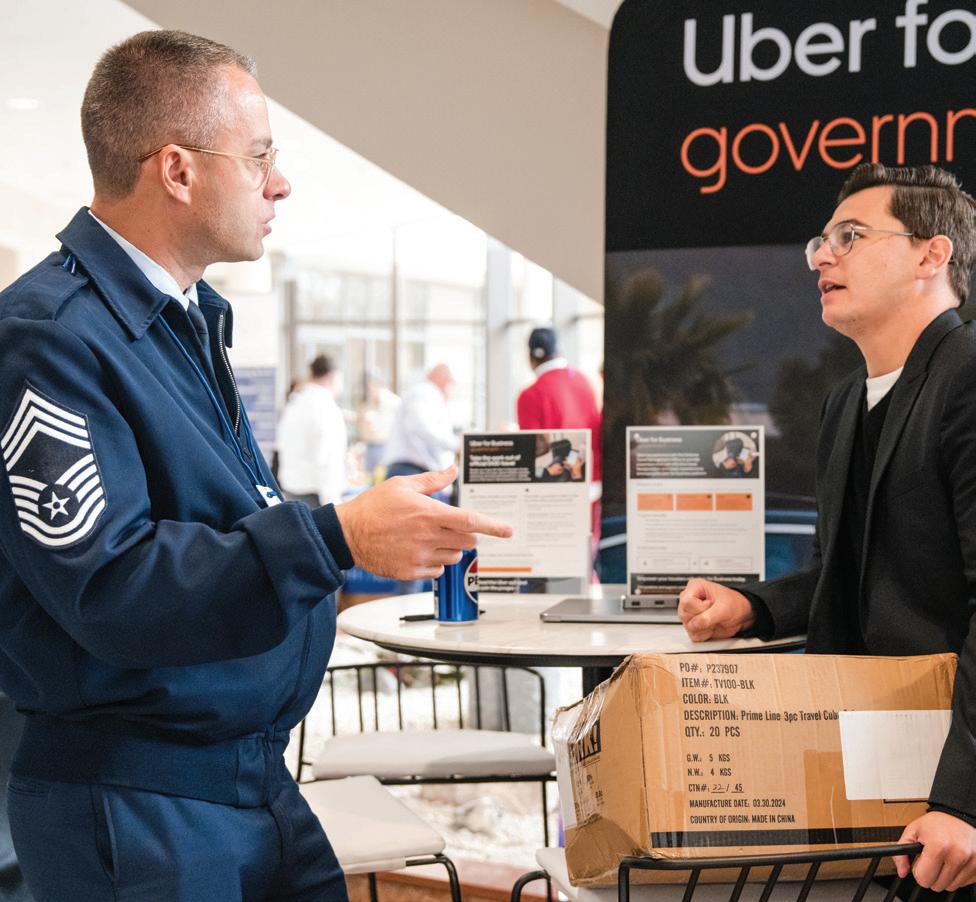



Come one, come all! The NDTA Exposition attracted its largest audience ever this year. Held in conjunction with the GovTravels Symposium, the jam-packed Expo is always the highlight of the week, providing an invaluable opportunity for attendees to share ideas, network, and learn about new products and services. The bustling Expo floor delivered on a rewarding and educational experience for everyone in an energized atmosphere.
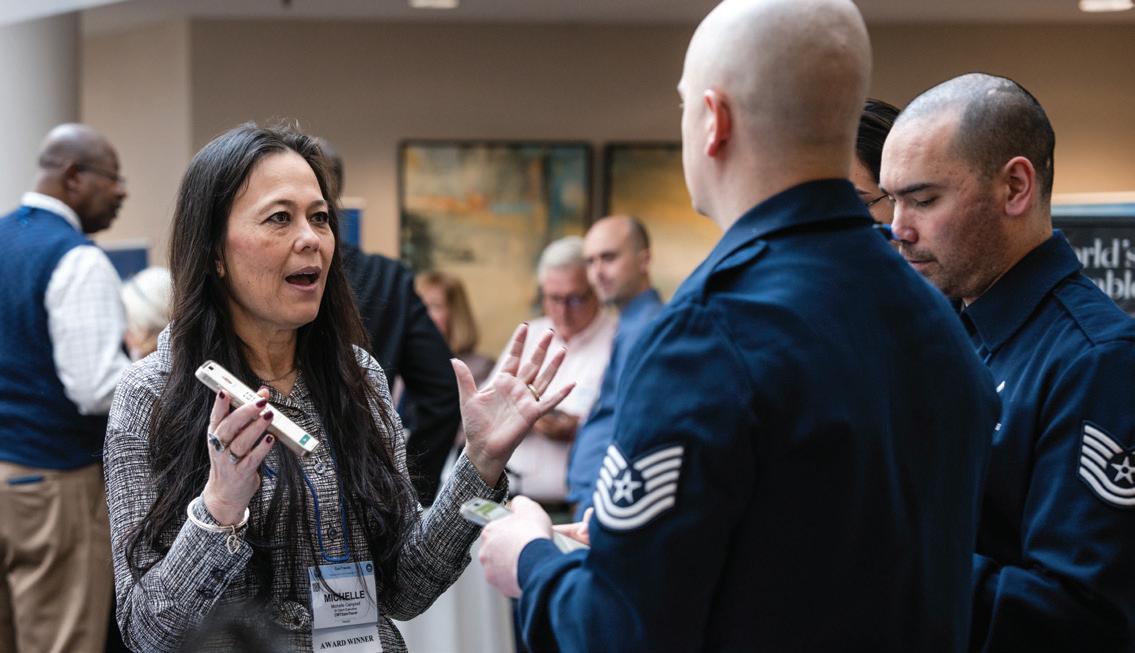
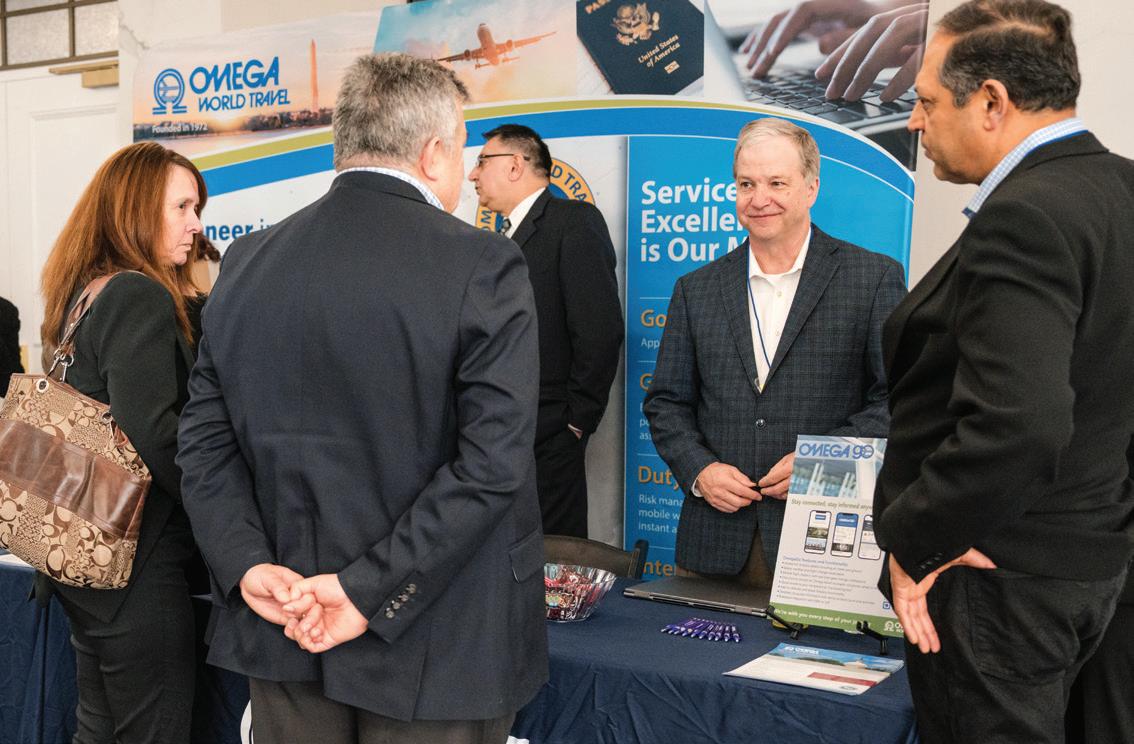
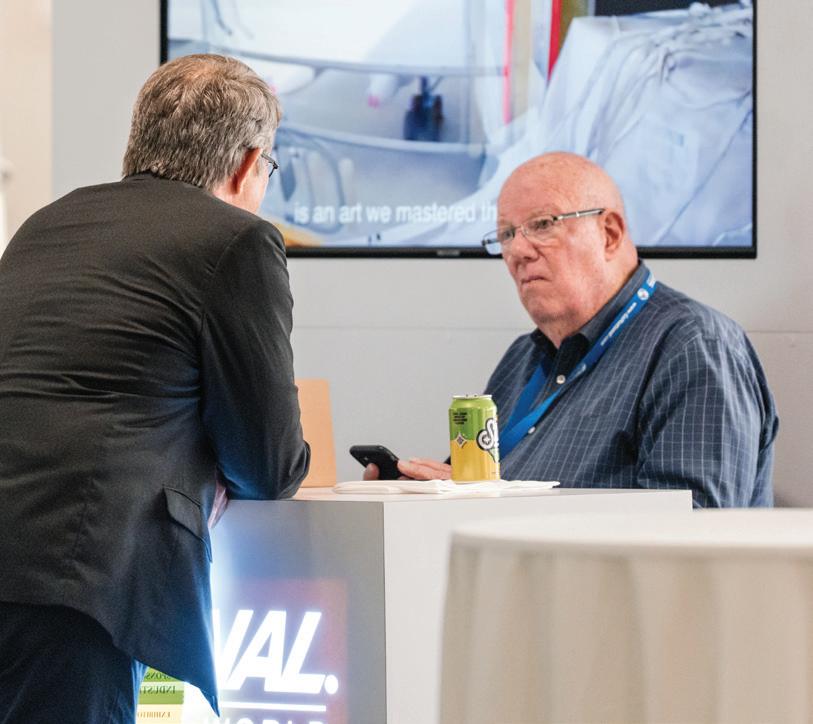






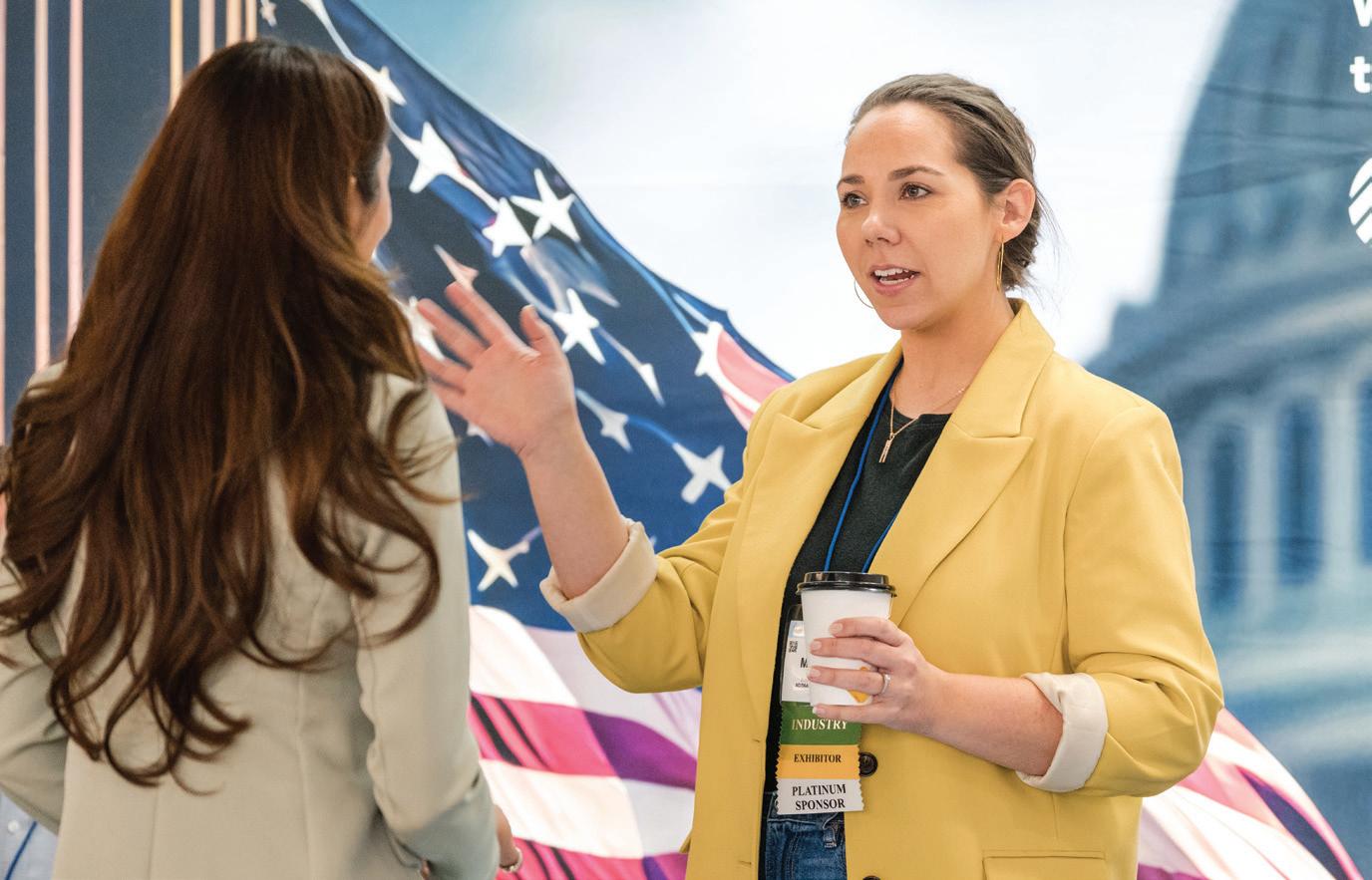



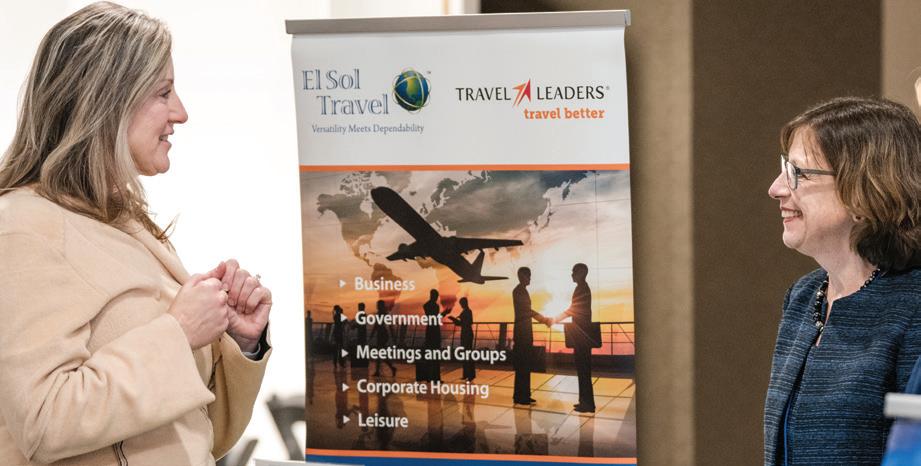



These corporations are a
AAR
AAT Carriers
Accenture Federal Services
Agility Defense & Government Services
AIR ONE
Air Space Intelligence (ASI)
Air Transport Services Group (ATSG)
AIT Worldwide Logistics, Inc.
Alamo City Engineering Services Inc.
American President Lines, LLC
American Roll-On Roll-Off Carrier
Atlas Air Worldwide Holdings
Bennett Family of Companies
BRW
C5MI
Carlile Transportation Systems, LLC
Chapman Freeborn International Ltd.
Corporate Travel Management (CTM)
Crowley
Deloitte
DHL Express
Enterprise Mobility
Fairwater Holdings Inc.
Federated Maritime, LLC
FedEx
Freeman Holdings Group
Gartner, Inc.
Global Critical Logistics
AEG Fuels
Hapag-Lloyd USA, LLC
HomeSafe Alliance
International Auto Logistics, LLC
JET Infrastructure
Kalitta Air, LLC
KGL
Landstar System, Inc.
Liberty Global Logistics LLC
Maersk Line, Limited
Matson
Naniq Government Services, LLC
National Air Cargo, Inc.
Omni Air International, LLC
Patriot Maritime
Port of Corpus Christi Authority
SAP
Schuyler Line Navigation Company LLC
Sealift, Inc.
SEKO Government, Space and Defense
SIXT Rent A Car LLC
Southwest Airlines
The Pasha Group
TOTE Group
Tri-State Motor Transit Co.
United Airlines
UPS
US Marine Management
US Ocean, LLC
Air Charter Service
Anew Solutions
Berry Aviation, Inc.
BNSF Railway
Boeing Company
Choice Hotels International
CSX Transportation
CWTSatoTravel
Echo Global Logistics
Geodis Transportation Solutions
Global Logistics Providers
GMR Transport LLC
ICAT Logistics
LMJ International Logistics, LLC
National Air Carrier Association
Norfolk Southern Corporation
Ocean Shipholdings, Inc.
PayCargo LLC
SAP Concur
Sikich
The Port of Virginia Transportation Institute
U.S. Bank
Western Global Airlines
Wyndham Hotels & Resorts, Inc.
SUSTAINING MEMBERS
3Sixty
Able Freight
Admiral Merchants Motor Freight, Inc.
Aimbridge Hospitality
All Aboard America Holdings
ALTA Group
American Bureau of Shipping
American Maritime Officers
American Trucking Associations
Applied Research Associates (ARA)
ArcBest
Army & Air Force Exchange Service
Arven Services, LLC
ATS Secure
Avis Budget Group
Baggett Transportation Company
Beltway Transportation Service
Benchmarking Partners, Inc.
Boyle Transportation
Bridgeway Connects, Inc.
Bristol Associates
BTX Global Logistics
BWH Hotels
C5T Corporation
CGI Federal
Coleman Worldwide Moving Construction Helicopters, Inc. (d/b/a CHI Aviation)
Council for Logistics Research
Cypress International, Inc.
D&G Support Services
Dash Point Distributing, LLC
Delta Air Lines
DeSpir Logistics Network
Drury Hotels Company, LLC
Duluth Travel, Inc. (DTI)
EMS Shipping & Trading GmbH
Ernst & Young
Europcar Mobility Group
Evans Transportation
Everts Air Cargo
FlexCold
Amyx
Apex Logistics International Inc.
CakeBoxx Technologies, LLC
Cartwright International
Dalko Resources, Inc.
Delaware River Stevedores, Inc.
Enterprise Management Systems
Gridiron Forwarding Co., Inc.
HLI Government Services
Gallantry Global Logistics
GeoDecisions
Global Secure Shipping
GMT Resources, LLC
Green Motion International
Green Valley Transportation Corp.
Groundswell
Hilton Worldwide
Hyatt Hotels
Hylant
IHG | IHG Army Hotels
Intermodal Association of North America (IANA)
International Association of Movers
International Longshoremen’s Association (ILA)
Interstate Moving | Relocation | Logistics
ISAAC Instruments LLC
Island Hospitality Management
J.B. Hunt Transport, Inc.
Jacksonville Port Authority (JAXPORT)
Keystone Shipping Co.
Kinedyne Defend
Lansdowne Coach LLC
Leidos
LMI
Marine Engineers’ Beneficial Association
Mayflower Transit
McCollister’s Global Services, Inc.
Mercer Transportation Company
mLINQS
National Van Lines, Inc.
Nika Corporate Housing
Northern Air Cargo, LLC
Omega World Travel
One Network Enterprises, Inc.
ORBCOMM
Patriot Global Lodging
Paxton Van Lines
Perfect Logistics, LLC
Plateau GRP
PODS Enterprises LLC
Port of Beaumont
Port of San Diego
Preferred Corporate Housing
Prestera Trucking, Inc.
JAS Forwarding
Lineage
Lynden, Inc.
Move One
NorSea Denmark A/S
Overdrive Logistics, Inc.
PITT OHIO
Port Canaveral
Port of Port Arthur
Trans Global Logistics Europe GmbH
Priority Worldwide
Prosponsive Logistics
PTS Worldwide
Radiant Global Logistics
Red Roof Inn
ReloQuest
Sabre
SAIC
Savi
SeaCube Containers
Sea Express American Corporation
Seafarers International Union of NA, AGLIW
Sealink International Inc.
Selsi International Inc
Signature Transportation Group
Sonesta International Hotels
SSA Marine
St. Louis Union Station Hotel a Curio Hotel
Collection by Hilton
StarForce National Corporation
Steam Logistics, LLC
Stevens Global Logistics, Inc.
Synergy Global Housing
Taft Law
The Hertz Corporation
The MITRE Corporation
The Suddath Companies
Thinklogical
TMM, Inc.
Toll Group
Trailer Bridge
Travelport
Triton Container International Limited
TTX Company
Uber for Business
UNCOMN
Union Pacific Railroad
United Van Lines, Inc.
US1 Logistics
VisionSafe
Women In Trucking Association, Inc.
World Fuel
XLG Transportation Inc.
Xwing Air, Inc.
Christopher Newport University
John D. Odegard School of Aerospace Sciences
Maine Maritime Academy
McKendree University
Purdue University
Saint Louis University
SUNY Maritime College
University of Missouri - St. Louis

Your service matters to us. It always has. It’s in the Enterprise name, a salute to our founder, Jack Taylor, and the World WarII aircraft carrier he served on. It’s in his legacy that continues to guide us. We know exceptional service matters to you, too. That’s why we’re committed to supporting active military, government employees and veterans with convenient locations, special car rental rates and personal service that


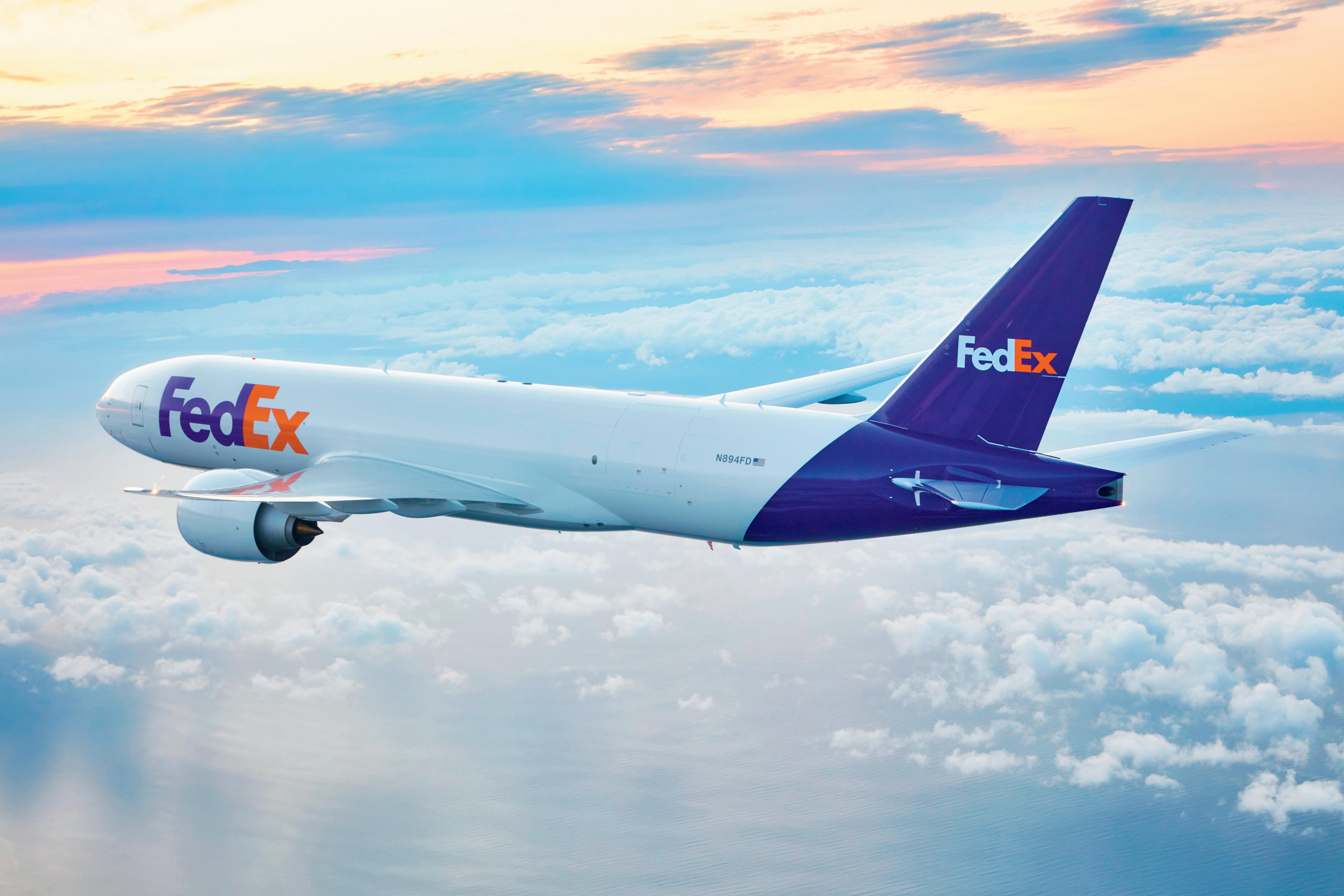
We celebrate those who always strive: to rise higher, push through every boundary, and overcome every obstacle